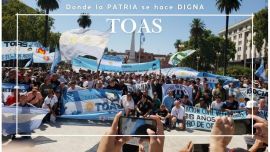Argentina's government on Tuesday accused the country's right-wing opposition of fuelling a dramatic erosion of the peso against the US dollar, and ordered an investigation.
The peso, at 227 to the dollar at the official exchange rate Tuesday, reached 497 pesos on the parallel "blue" market by midday – losing about 35 pesos to the dollar in just 24 hours and 80 cents (or 20 percent) in a week.
The slide started last week after several days of pressure on the peso in a period of pre-election uncertainty in a country with exchange controls in place to try to limit the effects of a financial crisis and rampant inflation.
Though the 'blue dollar' is traded in small amounts, its price is taken as a sign of the mood of the markets.
President Alberto Fernández has added to the uncertainty by withdrawing from the race.
On Tuesday, he accused economists and financial operators with connections to the opposition of actively speculating against the peso.
"This is a constant practice of the Argentine right. First, they set up rumours in the morning, they do [financial] transactions all day, and in the late afternoon withdraw their profit from the foreign exchange market, harming the savings of the majority of Argentines," he said on the sidelines of a meeting with his Romanian counterpart Klaus Iohannis in Buenos Aires.
Economy Minister Sergio Massa, for his part, denounced a situation "created by rumours... false information, and their impact on financial instruments linked to the dollar."
Massa vowed on his Twitter account that "we will use the tools of the State to put this situation in order.
"We will use economic criminal justice to investigate and shed light on certain behaviours, and the UIF and the CNV [two financial and stock market oversight bodies] for the analysis of money laundering transactions," said the minister.
Economist María Castiglioni told the TN broadcaster the devaluation may be the result of Argentines seeking "refuge" in the US dollar to protect their purchasing power as the country faces year-on-year inflation of 104 percent.
"I don't see anything tragic, just the fall of the peso, which is falling at a rate of seven percent a month [March inflation was 7.7 pecent]. But I don't see anything different from what has happened in other moments of these crises," economist Augusto Darget told the América 24 news channel.
In the context of the exchange rate run, Fernández met on Monday with Central Bank governor Miguel Ángel Pesce, but no information was made public about what was discussed.
The president said he is "working very closely" with Massa and assured that Pesce's position at the head of the Central Bank "was never under discussion."
– TIMES/AFP

























Comments